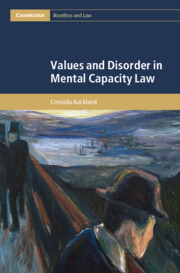Book contents
- Values and Disorder in Mental Capacity Law
- Cambridge Bioethics and Law
- Values and Disorder in Mental Capacity Law
- Copyright page
- Dedication
- Contents
- Acknowledgements
- Cases
- Statutes
- Introduction
- 1 A Value-Neutral Understanding of Capacity
- 2 An Essential Role for Values in Assessments of Capacity
- 3 Why Disorder Matters
- 4 Accommodating Values in the Test of Capacity
- 5 Reflecting Ambiguity on the Cusp of Capacity
- 6 Softening the Capacity Cliff Edge
- Conclusion
- Appendices
- Book part
- Bibliography
- Index
- Cambridge Bioethics and Law
3 - Why Disorder Matters
Published online by Cambridge University Press: 25 October 2024
- Values and Disorder in Mental Capacity Law
- Cambridge Bioethics and Law
- Values and Disorder in Mental Capacity Law
- Copyright page
- Dedication
- Contents
- Acknowledgements
- Cases
- Statutes
- Introduction
- 1 A Value-Neutral Understanding of Capacity
- 2 An Essential Role for Values in Assessments of Capacity
- 3 Why Disorder Matters
- 4 Accommodating Values in the Test of Capacity
- 5 Reflecting Ambiguity on the Cusp of Capacity
- 6 Softening the Capacity Cliff Edge
- Conclusion
- Appendices
- Book part
- Bibliography
- Index
- Cambridge Bioethics and Law
Summary
Where the real basis for finding someone to lack capacity is that you consider the beliefs or values that motivate their decision to be distorted by a mental illness, such that the decision is not authentically desired and so is unworthy of respect, this entails a number of empirical and normative claims. This chapter will interrogate these claims by reference to the wide-ranging literature on the nature of mental disorder, and on differing conceptions of autonomy and authenticity (as a component of autonomous decision-making). It will be concluded that while an agent acting on the basis of disordered beliefs or values will often be acting inauthentically (and thus non-autonomously), this will not always be the case, and situations could arise in which there is reason to believe that the agent would endorse or sanction their belief, even knowing it is derived from illness. Moreover, once the shaky conceptual ground on which such judgements must be made is acknowledged, it becomes essential that these judgements are brought out into the open, where they can be subject to appropriate scrutiny.
Keywords
- Type
- Chapter
- Information
- Values and Disorder in Mental Capacity Law , pp. 88 - 140Publisher: Cambridge University PressPrint publication year: 2024

